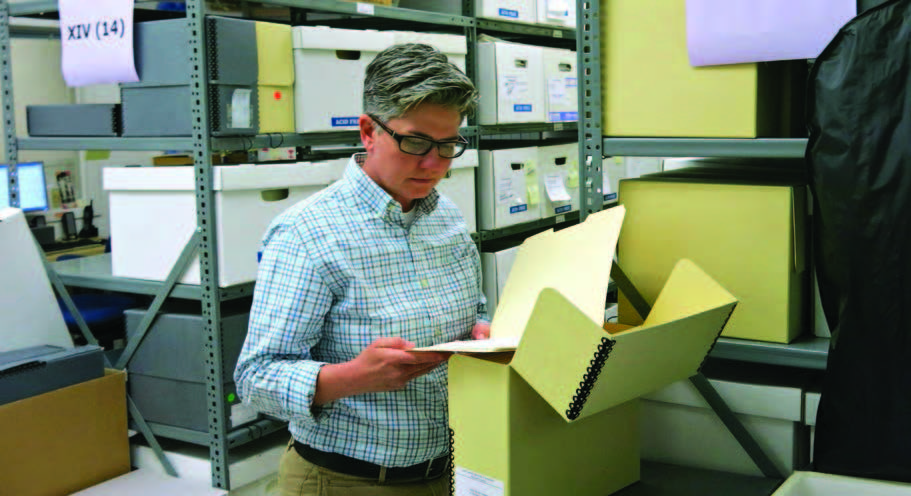 The archives of the GLBT Historical Society hold thousands of boxes of irreplaceable historical materials. Ever wonder what’s involved in making the contents available to researchers? Juliet Demeter is just the person to ask. As a project archivist, she has been processing collections at the Historical Society since 2012. A resident of West Oakland, just across the bay from San Francisco, Demeter received a master’s degree in library and information systems at Simmons College in Boston and formerly worked at the Bancroft Library at the University of California, Berkeley. Her current work is supported by a grant from the Council on Library and Information Resources (CLIR).
The archives of the GLBT Historical Society hold thousands of boxes of irreplaceable historical materials. Ever wonder what’s involved in making the contents available to researchers? Juliet Demeter is just the person to ask. As a project archivist, she has been processing collections at the Historical Society since 2012. A resident of West Oakland, just across the bay from San Francisco, Demeter received a master’s degree in library and information systems at Simmons College in Boston and formerly worked at the Bancroft Library at the University of California, Berkeley. Her current work is supported by a grant from the Council on Library and Information Resources (CLIR).
What’s important about the grant from the Council on Library and Information Resources?
The grant, which we received in collaboration with the ONE Archives at the University of Southern California, comes from CLIR’s “Cataloging Hidden Special Collections and Archives” initiative. Our project, entitled “Out West,” is designed to preserve and provide access to over 100 collections and 800 linear feet of historical records in our archives. At the end of the two-year project, we’ll be able make available an enormous number of collections that were previously unknown to scholars.
What’s involved in processing a collection?
Archival processing refers to the act of arranging and describing the papers of an individual or the records of an organization so they will be accessible to researchers, curators and other users. Each collection is unique, so the archivist needs to assess the level of processing required. Considerations include what kind of original order the papers are in, conservation issues, and the likely interest in the collection. Once the papers are arranged, the archivist creates a guide known as a finding aid. The final step is to provide a digital version of the finding aid to the public via the Online Archive of California.
What are some particularly interesting collections you have processed?
I have been fortunate to work on the papers of two fascinating San Francisco activists. First was José Julio Sarria, who passed away at age 90 last year. Sarria ran for the San Francisco Board of Supervisors in 1961; he is believed to be the first openly gay candidate for public office. In his own words, he was “a gay activist who used entertaining to get my message out.” The collection includes correspondence, photographs, ephemera, artifacts and costumes documenting his career as an entertainer and activist over half a century.
Now I’m working on the papers of Hank Wilson, a longtime gay-rights and AIDS activist who died in 2008. He helped form many well-known organizations in San Francisco including the Gay Teachers Coalition; the San Francisco Gay Democratic Club, which became the Harvey Milk LGBT Democratic Club; and ACT UP/Golden Gate. Wilson also was known for his controversial belief that poppers were a cofactor in HIV transmission and he worked tirelessly to help get them banned from bars and bathhouses.
Sarria’s papers are available to researchers now. We’re putting finishing touches on the finding aid pending some expected additions coming from his estate. And I hope to have Wilson’s papers completed by the end of the summer.
The GLBT History Museum: 4127 18th Street, San Francisco; 415-621-1107; www.glbthistorymuseum.org.
GLBT Historical Society: 657 Mission Street, Suite 300, San Francisco; 415-777-5455, ext. 3#; www.glbthistory.org.
Recent Comments